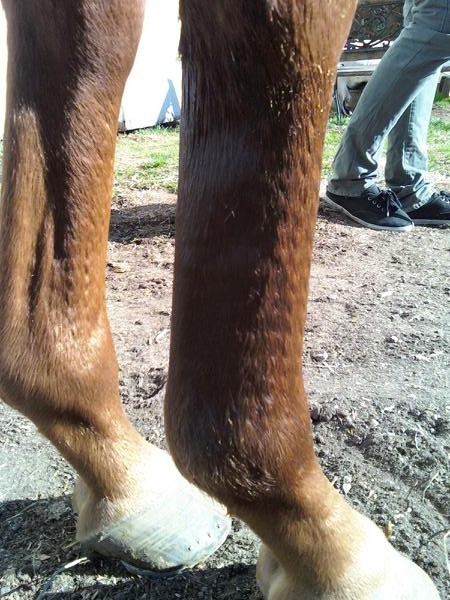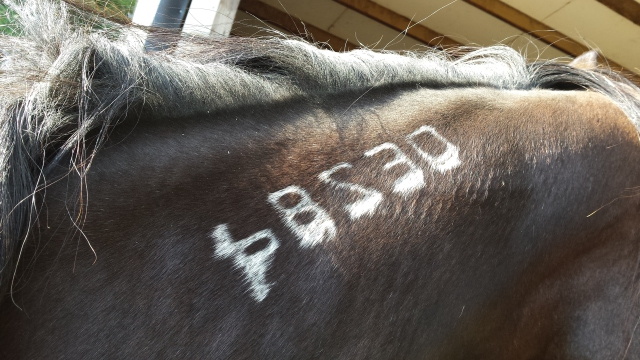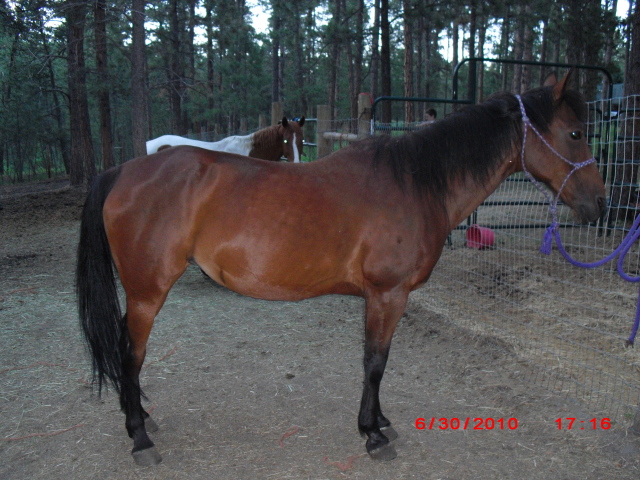QuestionQUESTION: Hi,
There is an element of nervousness when i'm with the horses, and most of it stems from how keenly i feel that they are a foreign animal to me. I'm fine around the ones i know, i have no hesitation in handling them or being around them, but for me its more that i know the individual rather than the 'horse'.
I'm already more comfortable around the new one than when i first asked you a question. But you are right, i do become a bit "hey whoa there, what are you doing?" when i'm around a new horse.
A great part of it i think is getting to grips with the fact that when you're standing next to a horse it impossible to actualy see the whole horse, as i tend to rely hevaily on their facial expressions, when i'm in a position that i can't observe that then i tend to feel a little hesitant and wondering if i'm missing some big cue. Like flattening the ears threatening a kick. Mind you, i think i can now pick up the twitchy-ness in their legs threatening a kick, but it things like that that put me on the defensive.
Another issue, again its all in my head, but with horses i don't have an "it's ok i'm a good guy" sort of statement. What i mean is, when i meet a new dog, or a stray dog in the street, who doesn't know me and is a little wary, just wondering how i'll react to him. And i'm a little cautious wondering how he'll react to me, all i really have to do is become overly cheery and friendly and pleased to see him, and they tend to go "oh ok you're a good guy, lets have fun", or "oh you're one of those, not interested".
I suppose in the end my problem is that i think too much.
Lisa
ANSWER: Hi Lisa,
I find myself unsure as to what to say next, but I'll try starting at the end. I cannot believe that it is possible to think too much, the issue is how the thinking is organised. I would hope that at this stage, you would know that horses, in general are very patient and long suffering creatures. They only react negatively to a very limited set of circumstances.
The first one I will deal with is the issue of dominance, not because it is more significant than the others, rather it is because it tends to be an open, or shut case, and I think that you can be in no doubt where I stand in that regard. The more complicated one is the question of fear. As essentially wild, free, prey animals this is of major importance. It is vitally important that when they feel under pressure for space or freedom, that you leave an "open door" through which they can escape (I can elaborate on that if you wish). The next thing is fear of (remembered) pain or discomfort through bad handling. We have already talked about this in relation to "Sam". What you have to do here is akin to the "iron fist in the velvet glove" approach i.e. take no guff, but be as gentle as you can. Incidentally there is something which has been on my mind to mention for some time, but I kept forgetting, and that is that I would never attempt to do anything to a horse that had it's head in the air. I know that you are not particularly enamoured with challenges, but I think it may be worthwhile to let you answer that one yourself.
Our relationship with dogs tends to be much simpler, in which the, "I'm a good guy, your a good guy" approach generally works, but we don't go on to put "tack" on dogs and then go on to ride them, so the opportunities for "misunderstandings" are more limited.
I suspect that a horse cannot kick or bite you without giving a warning (however brief), in the form of flattening the ears, and generally it should be possible for you to see this.
Overall I guess that what I am trying to say is that horses are "good guys", but that they have to be dealt with in an understanding (but not always a soft) way.
Once again I look forward to hearing your comments.
Slan,
Brendan
---------- FOLLOW-UP ----------
QUESTION: Hi,
its been a while, but this is actually more of an update than a question...though re-reading your last reply i was wondering about the part where you said you would never attempt anything on a horse with its head in the air.
And i theoretically agree, based on the fact that a horse with its head in the air is not a calm horse, and is in a position where they can easily rear or spin.
But if the horse just lifts her head because she wants to avoid you and knows you can't reach if she lifts her head high enough? I say this because if she's in a stubborn mood and notices you can still reach then she drops it down really low to avoid you that way.
As for the update, i've managed to get through the past few weeks without sam threatenting me at all (almost), until i come to tighten just before i get on.
i got into the habit of not just throwing over the saddle and blankets directly, but rubbing them softly up and down the girth line until she accepts that then putting them on her back. I get a lot of funny looks from her (i suppose she's trying to figure out what i'm doing), but no drama. At first it only worked with the saddle cloth but now i can get the saddle on her with no snapping teeth or head swinging round :)
I suppose the fact that i'm doing things in a way no one else does and is out of the norm also makes her pay more attention to me rather than reacting to what i'm doing on auto pilot.
I wish i could buy a longer girth for her, but she's not my horse. Mind you the leather straps are starting to stretch and fail (don't worry about us riding with a failing girth, we tighten the buckle beyond that point, there's not pressure on the weak bit), so when in comes to replacing it i can try encourage her to get a longer strap.
Best regards
and sorry for the long silence
Lisa
ps
getting along much better with the new 'dominant' horse, and might be riding her in the arena in the next few weeks. She still kicks the walls of her stall and threatens the other horses, but not me. I realized that overall she's a bit pushy and really tries to push her luck with everyone just to c what she can get away with, but she's not mean or as overly dominant as my first impression.
She's also on a lower protein diet and a lot calmer and more settled.
She's just very curious and gets bored easily, so if you correct her and put her in her place, she stays for a short while and then gets carried away and does it again
AnswerHi again Lisa,
I have to say that I am delighted to hear from you again(like a long lost friend). I am also delighted to hear of your progress with Sam. What you are doing with the blanket and saddle is exactly what I would do.I take it that when you are doing the final tightening that you do it very, very slowly.
It is also great to hear that you are making progress with the new animal. It seems that you may be getting a valuable lesson on the part diet, plays in the matter of their behaviour.
As regards the issue of the head in the air, I believe that it does not matter "why". Once it happens you are dealing with an animal that is on "high alert". In a case like that I would offer her my hand to sniff, and wait (possibly for a few minutes) until she lowered her head. When she lowers it too much I would simply give her a small slap on the shoulder to make her come up a bit.
Once again I would welcome any further thoughts you may have, meanwhile "best of luck"
Slan, Brendan

 Horse Health
QuestionQUESTION: My recently retired race horse came i
Horse Health
QuestionQUESTION: My recently retired race horse came i
 neck tattoo
Question1st mare
QUESTION: Have 2 mare that I ha
neck tattoo
Question1st mare
QUESTION: Have 2 mare that I ha
 sprint or a route
Question
sprint or a route
hello. looking at con
sprint or a route
Question
sprint or a route
hello. looking at con
 Mystery Mare
Question
Bay Mare
Hi there, I was curious if you could
Mystery Mare
Question
Bay Mare
Hi there, I was curious if you could
 A horse that doesnt like to be around unfamiliar horses
QuestionCruiser
QUESTION: Im 53, I have about a
A horse that doesnt like to be around unfamiliar horses
QuestionCruiser
QUESTION: Im 53, I have about a